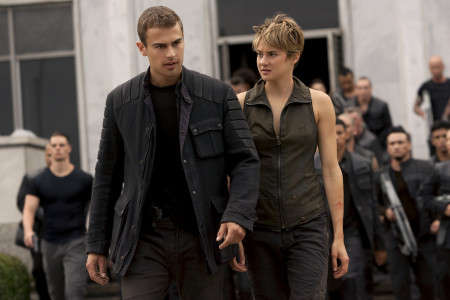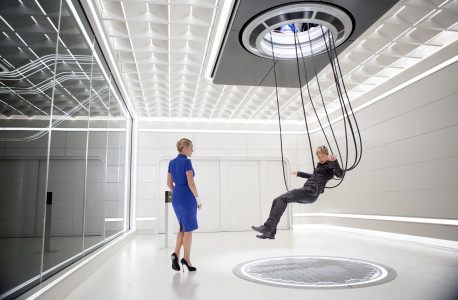Fri 20 Mar 2015
Made Redundant
Posted by admin under Film Review
Comments Off on Made Redundant
I know that I saw Divergent, the first entry in what’s since been officially tagged as The Divergent Series, a year ago, but I could barely tell you a thing about it 12 months later. Carefully engineered to be the next YA blockbuster, the movie pieced together elements drawn from various other successful movie and book series (including Veronica Roth’s titular trilogy, which served as the base source material) and performed just well enough to merit this sequel, which fills that lull between Oscar season and the earlier-than-ever launch of summer blockbuster insanity. But don’t go in expecting a recap of the previous installment; Insurgent leaps right into the action without much exposition. And since exposition was the one thing that I do recall Divergent had in spades, I wasn’t particularly sad to cut to the chase, such as it is.
And that’s really all that Insurgent amounts to: a slow-motion two-hour chase movie, where the heroes gingerly move through a post-apocalyptic setting, meeting various familiar and new faces—including Naomi Watts, presumably paid a lot of money for her few stiffly-acted scenes as the mother of Theo James’s love interest—staying several steps ahead of the villains until they realize that running isn’t worth the bother. The first hour is so devoid of meaningful content, you could literally walk into the theater at the 70-minute mark and start watching from there without missing a single dramatic beat.
That’s when Tris (Shailene Woodley), this franchise’s Katniss Everdeen avatar, walks into the lair occupied by Jeanine (Kate Winslet), Divergent’s version of President Snow, and submits to a series of mental tests designed to open the movie’s McGuffin…a box of unspecified mystical properties. Unlocking this box is Jeanine’s only real purpose in the movie, which explains why she doesn’t seem particularly concerned with devoting all her spare time and energy towards hunting down Tris. At least Snow made the (ultimately unsuccessful) effort to plot and scheme to rid himself of the troublesome Katniss; Jeanine literally waits for the heroine to come to her.
The lack of any memorable story elements or overall narrative drive might not be so pronounced if this post-apocalyptic future were even halfway interesting. The Hunger Games franchise took a big leap between the first and second movies in that regard, with the generically sketched-out universe that exists in the original installment turning into a more immersive world in the follow-up. The Divergent Series, in contrast, appears to be going in reverse. A significant amount of money was spent on the first movie, creating a version of a ruined Chicago where different factions inhabited different neighborhoods and people got around on zip lines suspended between skyscrapers.
Much of that detail has been erased by incoming director Robert Schwentke in Insurgent in favor of a series of interchangeable, depopulated sets strategically placed in front of greenscreens depicting screen-saver like backdrops of a crumbling metropolis. It’s likely that most of the money for this installment went to paying the cast—especially Winslet and Woodley—leaving only spare change on hand for things like production design and costumes. (Look closely, and you’ll spot the same five or six extras appearing and re-appearing as Jeanine’s soldiers throughout the movie, even after they’ve been used as cannon fodder.) The one visual effect that Schwentke did set some cash aside for is Tris plunging through glass panes, a flourish that he likes so much, he repeats it on a regular basis.
The disposable nature of Insurgent does little favor for Woodley, a smart, soulful actress who nevertheless doesn’t have the gravitas to hold down the center of this kind of action spectacle. That particular limitation might not have been so clearly exposed if Tris weren’t written as such a generic Chosen One, without any specific personality quirks or powers that make her role as the sole savior of this universe clear. In her best performances—specifically Alexander Payne’s The Descendants and Gregg Araki’s problematic, but intriguing White Bird in a Blizzard—Woodley has displayed a quick attitude and sharp temper that would have gone a long way towards giving Tris the kind of hard edge that might have made her stand out from her softly-realized surroundings. She wouldn’t even have to necessarily be a Ripley-esque bad-ass to hold our attention; if there was some spark of rebellion to the character, even the smallest sense that she’s fighting her destiny rather than running towards it, that would have played to Woodley’s strengths.
But everyone involved with Insurgent seems to recognize that quality is almost besides the point. The movie’s release date, coupled with the lack of competition, means that it’ll do well enough to justify its existence to the studio. Plus, the two-part final installment, Allegiant, has already been booked for 2016 and 2017 respectively. For the cast, crew and audience, it’s just a matter of waiting this series out and hoping something more interesting comes down the pike.



No Responses to “ Made Redundant ”
Sorry, comments for this entry are closed at this time.